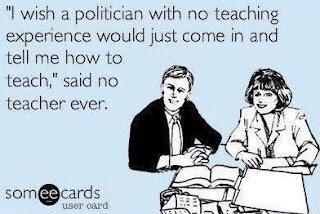
Teachers Want To Teach
Amid all the test-score hoopla, the Florida/Indiana Education scandal, and the Common Core brouhaha you may have missed this one —
This article was going around last week, and in case you missed it, we’ve put the link here.
This newly-retired high-school teacher takes us through the challenges he faced on a daily basis: most notably, how high-stakes testing took a toll on the actual teaching he could do. What the author does well is put the issue in historical context, going back to the beginning of No Child Left Behind (NCLB) in 2002-3. As an Advanced Placement U.S. Government and Politics teacher (nicely ironic to the argument), he not only assesses the quality of incoming students, but gives his theories on why their skills declined. He points out (non-critical-thinking) multiple-choice tests, the proliferation (and watering-down) of AP classes, grading by rubric (whereby a list of facts trumps solid writing skills), and the age-old teacher problem of too many kids in the classroom.
In my days teaching 6th, 7th, and 8th grade I often had 34+ students in a class. Taking this author’s argument one step back, to middle school: if he had a hard time assigning and grading 160 essays (some quick math gives him 13 hours of grading), imagine 210 6th through 8th grade English essays in which, nightmare of nightmares, we were trying to structure an argument with a thesis, supporting quotes, and a conclusion. I feel this man’s pain.
He hits a nerve, too, when he asks how politicians who have never taught are responsible for creating laws and requirements for teachers. While this drastically simplifies the real process (given the machinery of Ed Reform and its like, the process does involve real educators, sitting on panels which make recommendations), it does point to a specter that looms large especially in NYC Public schools, namely:
Teachers want to teach. Administrators and Guidance Counselors get into this profession to help children learn and deal with their development. The machinery and policies of education make this tough.
This outgoing teacher ends on blame and an apology (to paraphrase what’s a very nicely written piece). But maybe instead of fanning the flames, we can have a meaningful discussion.
And so, the question: why do good teachers, administrators, counselors have to fight the very educational system in which they work, in order to make a difference?
We want to hear from you on this issue. Sound familiar? Tell us your story.
Post to our Facebook wall www.facebook.com/ctrteachered
Tweet at us @CtrTeacherEd
Or leave a comment below.
Please SHARE.


